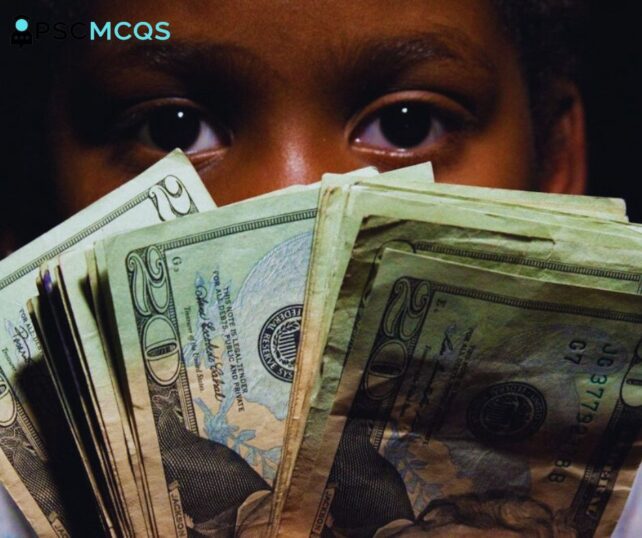The Informal Economy of Pakistan
According to the World Bank Report 2022, the total size or amount of the Informal economy of Pakistan is almost 457 billion dollars. It shows the level of the informal economy in Pakistan.
The Informal economy of Pakistan refers to the undocumented businesses, services, products selling, and all types of business, industrial, economic, and commercial activities that are performed hidden. They are not registered or paying legal taxes to the authorities.
What are the examples of informal sectors of the economy?
- Domestic Workers who work in private homes.
- Home-Based Workers (including Garment Labor).
- Street Vendors who perform cleaning jobs.
- Lastly, waste Pickers.
What are the Impacts of the Informal economy?
The informal economy, also known as the underground economy, shadow economy, or black market, consists of economic activities that are not regulated by the government or included in official statistics. These activities can range from street vending and small-scale manufacturing to unregistered employment and undeclared work. The impacts of the Informal economy can be both positive and negative, and they vary depending on the context. Here are some common impacts:
Contribution to GDP:
The Informal economy is black or shadow economy. However, the Informal economy often makes a significant contribution to the overall GDP of a country. Especially in developing countries. While shadow economy activities may not be officially recognized. Whereas, they generate jobs, revenue, and in some situations revenue for the government.
Also read: How can Pakistan improve its economy?
Employment Opportunities
Informal economic activities also provide employment opportunities, particularly for individuals who may not have access to formal employment. Sometimes due to a lack of expertise, education, and required skills, many workers cannot get jobs. So, it provides a better chance of employment to workers and labor. due to factors such as lack of education, skills, or legal status.

Informal Economy Reduce Poverty
Although the informal economy is not legal. But often, participation in the Informal economy is a means of survival for marginalized populations. It allows individuals and families to meet their basic needs and earn a livelihood by providing income that may not be available through formal channels.
Also Read: Economic Organization
Flexibility and Adaptability:
Informal economic activities often have features of flexibility and the ability to adapt to changing circumstances. This can be advantageous in volatile or uncertain economic environments, allowing individuals to respond quickly to market demands or shocks. In this way, the informal economy shows high performance.
Tax Revenue Loss Due to Black Economy:
The Informal economy’s biggest loss to the government is the loss of taxes and levies as well as other government dues. Governments may lose tax revenue because informal economy transactions typically escape taxation. This can strain public finances and hinder the government’s ability to provide essential services such as healthcare, education, and infrastructure.
Therefore, loss of government revenue due to the Informal economy is the biggest issue of the informal economy.
Labor Rights Welfare:
In black economy workers have no rights like the workers are enjoying in the formal economy. Workers in the Informal economy often lack access to labor rights, social protections, and benefits such as healthcare, pensions, and unemployment insurance. This leaves them vulnerable to exploitation, unsafe working conditions, and economic insecurity.
What are the measures to control the Informal economy?
Controlling the informal economy requires a holistic approach to work at different things. There is a need to make the process of doing business easy, easy registration of business. Similarly, there should be such a rate of taxes that can be easily paid by the business community. Because sometimes the Informal economy exists due to irrational policies of government.
Regulatory Reforms:
Implementing regulatory reforms to simplify business registration processes, reduce bureaucratic barriers, and streamline compliance requirements can encourage informal businesses to formalize their operations.
Taxation Policies:
Developing tax policies that are fair, transparent, and conducive to formalization can incentivize informal businesses to enter the formal economy. This may include offering tax incentives or amnesty programs for informal businesses that register and comply with tax obligations.
Access to Finance:
Improving access to formal financial services, such as credit, banking, and insurance, can help informal businesses transition to the formal sector by providing them with the necessary capital and resources to expand their operations.
Social Protection Programs:
Implementing social protection programs, such as healthcare, pensions, and unemployment benefits, can help reduce the incentives for individuals to engage in informal work by providing them with alternative sources of support and security.
Labor Regulations:
Strengthening labor regulations and enforcement mechanisms to protect the rights of workers, ensure fair wages, and improve working conditions can help deter informal employment practices and promote formal employment opportunities.
Education and Skills Development:
Investing in education and skills development programs to improve the human capital of informal workers can enhance their productivity and employability, making it easier for them to transition to formal employment or entrepreneurship.
Public Awareness Initiatives
Launching public awareness campaigns to educate informal businesses and workers about the benefits of formalization, as well as the risks associated with operating in the Informal economy can help change attitudes and behaviors towards compliance.

Partnerships and Collaboration Business Community
Foster partnerships and collaboration between government agencies, civil society organizations, and the private sector to develop comprehensive strategies and initiatives to address the root causes of informality and promote formalization.
Inclusive Economic Policies:
Implementing inclusive economic policies that promote equitable growth, create formal employment opportunities, and address structural barriers to entrepreneurship can help reduce the prevalence of the Informal economy over the long term.
Conclusion:
Informal economics generate revenues for the people, but not for the government. Therefore, the government should systematically reduce and control the culture of informal, or black economy with strategies and formal policies.

